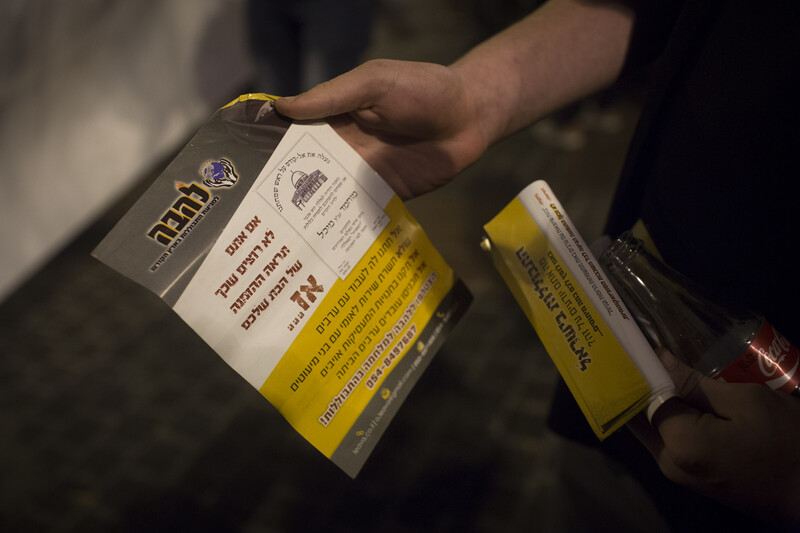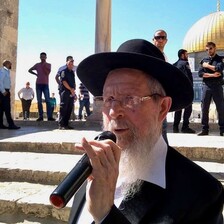The Electronic Intifada 31 January 2017

Liberal Israelis protest Lehava in Jerusalem after three of its members were charged in an attack on a mixed Jewish-Arab school, December 2014.
ActiveStillsLawmakers in Benjamin Netanyahu’s ruling coalition are trying to deflect attention from sex crime scandals involving the highest echelons of Israeli society by making false allegations against Palestinians and other non-Jews.
In recent months, a long list of senior Israeli officials, including members of Prime Minister Netanyahu’s inner circle, have been investigated and, in some cases, convicted for sex crimes against women and girls.
But rather than acknowledging the problem in their own ranks, right-wing members of the Knesset, Israel’s parliament, are renewing their efforts to paint Palestinians as the prime perpetrators.
At a December 2016 session of the Knesset’s status of women committee, legislators from parties in the ruling coalition – particularly the far-right Yisrael Beiteinu – alleged that there was a pattern of Palestinian men and boys preying upon Jewish women and girls.
Yulia Malinovsky, a representative of Yisrael Beiteinu, started off the session by asserting that in the Jerusalem area in the previous nine years, there have been 800 cases where Jewish Israeli women were sexually assaulted or sexually harassed by Palestinian men “based on nationalist motives.”
“Why are we forbidden to talk about the phenomenon of sexual harassment by Arabs? Because it’s not politically correct?” Malinovsky queried.
Her party colleague Oded Forer argued that any sex crime “motivated by religion or nationalism is a terror attack in every possible way.”
The lawmakers lacked evidence to back up their allegations. That much became clear when Ayelet Orenstein, head of the department for sex crime victims in the Israeli police, testified to the Knesset committee.
Orenstein told the committee that, according to police statistics, the number of sex crimes in mixed cities where Israeli Jews live in close proximity to Palestinian citizens, has not increased in recent years. Rather, it has decreased.
Orenstein explained that the decrease applied both to sex crimes in general, and specifically to sex crimes in which a non-Jewish person was the perpetrator.
The right-wing legislators grew agitated when Orenstein would not corroborate their claims of a plague of Palestinian-on-Jew sex crimes. She was then asked to explain the disparity between her own statements and the aforementioned statistic of 800 sex crimes, which Malinovsky insisted had also been provided by the police.
After examining a document handed to her by Malinovsky, Orenstein explained that the 800 cases referred to included all assaults committed in Jerusalem in the past nine years, regardless of whether or not they were sexual in nature.
Orenstein’s “rough estimate” – her words – was that the number of relevant reported sex crimes in Jerusalem during this time period was around 200 – a quarter of that claimed by Malinovsky.
This was not the first Israeli effort to portray Palestinians as sexual predators – and it was unlikely to be the last. In fact, the committee meeting bore great resemblance to another Knesset session held just over five years earlier.Frightening increase?
In December 2011, the Knesset’s immigration committee convened for an “urgent” session on “the kidnapping of new [Jewish] immigrants by minorities,” the latter a euphemism for Palestinian citizens of Israel.
Opening the meeting, then-Likud lawmaker Danny Danon said: “We have all heard horrible stories of a frightening increase in the number of cases of young women who come from a poor socio-economic background that are simply kidnapped [by Palestinians]. At first when I was told about it, I said, ‘What do you mean kidnapped? It’s probably a romantic relationship, consensual.’ But it turns out that there are cases in the State of Israel, in the year 2011, of girls physically kidnapped in the middle of the day, in Kiryat Malakhi, in Arad, in Beer Sheva, in Nahariya, that minorities simply force women into the car.”
Then, too, a representative of the Israeli police department for sex crime victims – Rachel Greibin – denied the existence of any such phenomenon or increase in attacks on Jewish women by Palestinian men. “That phenomenon has not been seen by the police, the phenomenon you have just described is unknown to us,” Greibin said.
Upon Danon’s insistence that he heard an unnamed police commander claim that this type of cross-cultural sexual violence was increasing, Greibin responded, “We do not have data or lots of cases of kidnapping.”
Danon now serves as Israel’s ambassador to the United Nations.
The attempt to frame Palestinians as sex offenders is a favored tactic of the Israeli far right. Israel’s anti-miscegenation movement is keen to cast the relatively rare romantic relationships between Jews and Palestinians as abusive, in order to justify such groups’ continued existence and their funding budgets.
Minutes of the 2011 Knesset committee meeting confirm that the session was stacked with members of Yad L’Achim and Lehava, two groups that oppose marriages between Jews and people of other religions.
Smear strategy
Similarly, the recent session of the status of women committee heard complaints from female members of Im Tirtzu, an anti-Palestinian group that a Jerusalem court ruled may be fairly described as “fascist,” and Students for the Temple Mount, a group that seeks to destroy the al-Aqsa mosque in Jerusalem, one of Islam’s holiest sites. Anat Gopstein, anti-miscegenation activist and wife of Lehava leader Bentzi Gopstein, was also in attendance.
Unsurprisingly, the December session concluded with Malinovsky proposing that the government dispense additional funds to Israeli anti-miscegenation groups. “Today there is a budget of 50 million shekels [$13 million] for the war on violence against women. I ask of all the relevant bodies and the committee chair that part of this money will be apportioned to treat the problem of sexual harassment on a nationalist basis in mixed cities.”

Right-wing activists distrubte flyers urging Israelis to “Join Lehava in the war on miscegenation” in Jerusalem in October 2014.
ActiveStillsFalsely charging Palestinians with rape isn’t exclusive to Israel’s far right. In May, Netanyahu himself falsely accused two Palestinians of raping a Jewish woman.
Soon afterwards, Israeli police revealed that no such rape had ever occurred. Rather, the woman’s parents had concocted the rape accusations upon learning that their daughter had been dating a Palestinian man, Israeli police said.
In Israel, the rape smear strategy has even been adopted by Jewish supremacists trying to thwart liaisons between Black Jews and Black people of other religions. In 2013, Israeli journalist Danny Adino Abebe publicly accused African refugees of kidnapping 1,000 Israeli citizens of Ethiopian descent. After this writer demanded that Abebe provide evidence for his claim, he quietly removed his article from the Internet.
Budgets for bigotry
The Israeli government continues to fund groups which openly aim to end miscegenation in order to preserve Jewish ethnic purity.
In October, Or Kashti of the Tel Aviv newspaper Haaretz reported on anti-assimilation groups receiving funds from the Israeli government to move to cities with a mixed population of Palestinians and Jews. The understanding behind the funding was that its recipients would try to drive wedges between Jews and their Palestinian neighbors.
Naftali Bennett, in his capacity as Israel’s diaspora affairs minister, has been promoting the importance of the “Jewish family” – a thinly veiled reference to endogamy. Preventing sexual relations between Jews and people of other religions appears to be a major goal of a program for which the Israeli government earmarked $50 million between 2014 and the end of 2017.
The diaspora affairs ministry spent $500,000 on a propaganda video arguing that miscegenation puts the Jewish people in peril. The video was broadcast on Israeli television in December.
In his role as education minister, Bennett approved a move to drop a Hebrew-language novel titled Borderlife from the academic curriculum in 2015 because it described a fictional romantic relationship between a Jewish Israeli woman and a Palestinian man. In December 2016, the education ministry introduced new rules to make it easier to ban books in the future.
Taunting
The accusations leveled at the recent status of women committee meeting against Palestinian citizens of Israel raised the ire of Palestinian representatives in the Knesset. Jamal Zahalka, head of the Balad Party, argued at the meeting that Palestinian citizens of Israel are committed to combating sex crimes.
“In Arab society, as in Jewish society, men that attack women, regardless of who they are, are considered the scum of the human race, despicable people that are rejected by society,” said Zahalka.
“In my opinion, the courts do not sentence with enough severity. I want every Arab that is convicted – not by politicians, but by the courts and police – to face the full weight of the law. Even more than a Jew, I don’t care. We as a society want this. Conduct a poll, and 99 percent of the Arab society will tell you: Not five years in jail, 10 years in jail. So let’s not make this a sectarian issue.”
Zahalka called on Jewish and Palestinian parliamentarians to stop trying to turn sexual assaults into a racial issue and to work together to tackle the problem.
“On this issue there is consensus,” Zahalka said. “It’s one of the rare issues in the Knesset where everyone agrees that we must combat the phenomenon. So you come here and present it as if it’s a subject for disagreement and taunting?”
Despite Zahalka’s comments, some elements of Israeli society have continued to display a disturbing attitude towards sex crimes. The week after the status of women committee meeting, former Israeli president and convicted rapist Moshe Katsav was released from jail, granted early release from prison. Katsav was welcomed to his home town of Kiryat Malakhi with public fanfare.
In the days that followed, Israeli police recommended charging Moshe Dadon, head of a local authority in the Jerusalem area, with rape and other sex crimes against several women.
In January, it emerged that yet another senior Israeli politician is now being investigated over sex crimes. Amnon Cohen, a member of the Knesset from 1999 to 2015, is accused of being bribed by a businessman with sexual favors. A woman told a court in Lydda (Lod) – a city near Tel Aviv – that she was coerced into having sexual relations with Cohen, saying she was “afraid for my life.”
For these reasons and others, the liberal Israeli news site +972 Magazine named “the women standing up to sexual harassment” as its “person of the year” for 2016.
But if the Jewish-Israeli leadership continues to frame Palestinian men as sex predators and interracial relationships as treason, just so that they can avoid tackling the sex crime epidemic in their midst, that honor will offer only cold comfort.
David Sheen is an independent writer and filmmaker.
Tags
- Benjamin Netanyahu
- rape culture
- Israeli Knesset
- Yisrael Beiteinu
- Yulia Malinovsky
- Oded Forer
- Ayelet Orenstein
- Danny Danon
- Yad L’Achim
- Lehava
- Im Tirtzu
- Students for the Temple Mount
- Anat Gopstein
- Bentzi Gopstein
- Danny Adino Abebe
- Or Kashti
- Naftali Bennett
- Jamal Zahalka
- Moshe Katsav
- Moshe Dadon
- Amnon Cohen
- women





